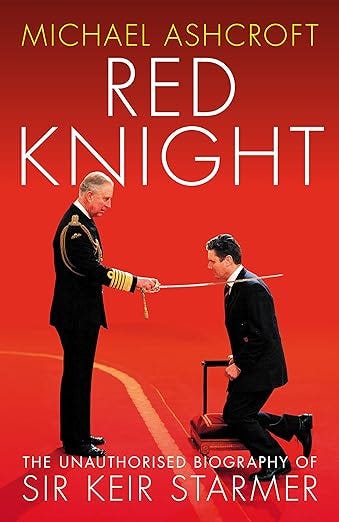Lord Ashcroft writes bad books. I know this because I once had to read his Rishi Sunak biography, Going for Broke: The Rise of Rishi Sunak, for work, and it was a hard slog - or at least, as hard a slog as a book that you can read in an afternoon can be.1
The Ashcroft method is to mash together press cuttings, all of them taken at face value, with some perfunctory conversations with people who know the subject of the biography (maybe I’m being unfair, and the conversations were not perfunctory, in which case we can conclude that the notes were perfunctory) and string them in chronological order into a narrative with no useful analysis at all. For example, the Sunak book gives plenty of space to its subject’s fairly banal local newspaper columns - possibly written at least in part by his constituency staff - as more or less the only contemporary material in his name from the early part of his parliamentary career, without pausing to consider whether they are actually all that important, or that he might not really be setting out his innermost thoughts in the Darlington & Stockton Times.
This kind of quick-and-dirty cuttings-job bio has a value, not least to people who want to be confident of the basic facts and chronology as a precursor to doing something with them. But a Michael Ashcroft-authored biography is unlikely to be of much use to, for example, biographers.
According to the Sunday Times,2 however, another Ashcroft book is about to take on a new political significance:
No, not that one.3 This one:
Red Knight, the unauthorised biography of Starmer by the Tory pollster Lord Ashcroft, is seen by some in Conservative Campaign Headquarters (CCHQ) as an attack bible — chronicling controversial cases, including the prosecution of journalists for phone hacking. Starmer was a defence barrister from 1987 until he became DPP in 2008.
The book recounts how Starmer:
● Was part of a team opposing the extradition of a Saudi national, Khalid Al-Fawwaz, to the US in 2000 on charges relating to the 1998 bombings of the US embassies in Kenya and Tanzania, which killed 224 people. Al-Fawwaz received an estimated £1 million in legal aid and it was later proven that he ran the London office of al-Qaeda.
● In 2001 helped represent a group of armed prisoners who escaped from Whitemoor prison in Cambridgeshire in 1994, during which a prison officer was shot. The case cost taxpayers £500,000.
● In June 2002 defended a man who featured in a BBC documentary, The Hunt for Britain’s Paedophiles. Starmer tried to get the man’s face pixelated on screen and lost.
● In March 2006 acted for Hilal al-Jedda, a British-Iraqi national suspected of recruiting terrorists to Iraq. He was instructed by Public Interest Lawyers, run by the left-wing solicitor Phil Shiner, who was later struck off after falsely claiming British soldiers murdered and tortured hundreds of civilians in Iraq.
The problem with this is not that Ashcroft’s book on Starmer is bad.4 It is that there is nothing in it which is not already in the public domain. I don’t just mean that there’s nothing in the book now that wasn’t in the book in 2021, although obviously there isn’t. I mean that there’s nothing here that hadn’t already been published before that, in the newspaper cuttings assembled by Ashcroft in the course of putting the book together.
Even if you’d missed them when they were first published, and missed them when they were in Ashcroft’s book, the list of cases in the quote above, from this week’s Sunday Times, is in… this week’s Sunday Times. It isn’t going to be easy at this point for any other paper to print any of these as an exclusive.
Generally speaking, it is more difficult to get a news journalist to write a story as news if someone else has already written it: this is fair enough, because if someone else has already written it, it is no longer news. Nothing in Red Knight is news, because it is in Red Knight. If anything in it now appears as news, this will reflect badly on the journalists concerned and the newspapers that employ them. Red Knight isn’t hidden in a dusty inaccessible archive somewhere: it was literally serialised in the Mail on Sunday two years ago.5 And yet CCHQ appears to think that retreading stories from it that were already retreads when they were put in the book in the first place is a viable attack plan.6
Not all of the stories about Starmer’s legal past are damaging. For example, this week the Mail on Sunday reports that he once acted to save a much-loved dog from being put down (is this in Ashcroft’s book? I don’t know! I haven’t read it!). This one’s moral narrative is so confusing - the dog bit someone (bad) but its owners really loved it (good) but Starmer defended it on human rights grounds (bad) but the dog was reformed and lived happily ever after (good) but the case cost £65,000 (bad) - that I’m not entirely sure what the Mail wants me to think of it, or of Starmer, and I can’t tell if the story is a Tory plant or just a piece of unprompted investigative journalism. “Starmer loves dogs and saves them from death row” is not the most powerful attack line I can think of, although we have to remember that as a barrister Starmer was subject to the cab rank rule and might actually hate dogs.
In all of these cases, the story amounts to “he was a barrister”. Are there more of these stories out there? Yes, probably: he was a barrister. But I’m not at all sure there’s a day two story with any of them. In the end, the line is both relatively painless in the first place and subject to diminishing returns.
Labour has made it clear, according to the Sunday Times piece, that it will “meet fire with fire”: if the Tories attack Starmer for his past legal career, they will attack Sunak for what he got up to in his previous work as a hedge fund manager. Having spent an afternoon I won’t get back reading a biography of Rishi Sunak, I hope Labour do their own research. If they want to say anything interesting or newsworthy, they’ll have to do a better job at investigating Sunak’s past than Lord Ashcroft did.
I said the other day, after writing about Penny Mordaunt’s claim that “It’s a good job the nativity didn’t take place in Labour-run Wales”, that there might not be any more Dividing Lines posts before Christmas. Well, it turns out there’s this one. But I repeat: there might not be any more Dividing Lines posts before Christmas. Subscribe now to get more Dividing Lines posts after Christmas.
The back of the Sunak book includes some blurb for Ashcroft’s biography of David Cameron, Call Me Dave, in which the following review, by Helen Lewis:
…has been edited down to this:
I laughed, anyway.
The Sunday Times piece is co-bylined by Tim Shipman, and does at least say that Lord Ashcroft wrote the Starmer book; a previous Shipman-bylined piece in 2022 hilariously described his book on Carrie Johnson as “a biography bankrolled by the Tory peer Lord Ashcroft”, which is an amazing drive-by shooting of its only credited author.
This is a pre-2010 Labour policy team in-joke which about three people will find funny. Sorry.
Although by all accounts it is. I haven’t read it, so I’m relying on the judgement of people braver than me, who report, for example, that “the donkey paddock gets four pages; Claire Ainsley [Starmer’s first director of policy, and therefore someone whose views might be worth reflecting on when assessing his politics] one sentence. Both prying and incurious”.
Sample text from the Mail on Sunday serialisation:
After the move to Tanhouse Road in Oxted, Rodney continued to work in the toolmaking trade but, due to his son's ambiguous explanations, there has always been a certain amount of confusion as to his employment status.
In March 2018, Starmer told the BBC's Nick Robinson that his father 'was a toolmaker working in a factory and working every hour, basically'. The following year, he told the BBC Radio 4 Today programme that his father 'worked in a factory' as a toolmaker.
The inference that listeners might have drawn is that Rodney Starmer was employed by somebody else. Yet the available evidence suggests that this was not the case.
For reasons best known to himself, Keir Starmer did not use any of these opportunities to explain that his father, in fact, ran his own business, the Oxted Tool Company.
As a Companies House representative has said that no records of the Oxted Tool Company exist in its files, it is difficult to assess how successful Rodney Starmer's business became and indicates that he may have remained a sole trader – as opposed to running a limited company – throughout his working life.
As a skilled manual worker who was self-employed and who owned a house (albeit with a mortgage), it is arguable that Rodney would be thought of by some social scientists as being a cut above other toolmakers who were employed.
None of this would matter in any way, of course, but for the fact that Keir Starmer has not been totally explicit about it when asked.
This is prose which mostly makes you think of backing away from someone in a pub. On this evidence, perhaps CCHQ’s assumption that nobody could possibly have made it all the way through the book, and that anything they find in it counts as a brand new revelation, is not as unreasonable as it sounds.
They might be right. I don’t want to deny the problem for Labour of the Tories playing politics on easy mode: the idea that they get away - thanks largely to the uneven balance of political allegiances across the print media, combined with the BBC’s willingness to follow the print media’s agenda even if not their political line - with standards Labour would never be allowed to sink to. Even though there’s a risk of it sounding like sour grapes, I do think it’s true that the two parties play on different pitches, media-wise: as one non-Tory staffer who worked with Tory colleagues on the cross-party Remain campaign in 2016 was quoted as saying, “Every time the Mail gave them a bad headline we’d say, ‘Welcome to our world.’” But at the same time, once the Tories are on the kind of downward spiral they’re on now, it doesn’t save them from two countervailing forces. First, stories of their incompetence and failure will still lead the news, thanks to the fact that they are the government and what governments do should lead the news. And second, their attack operation isn’t very good.







